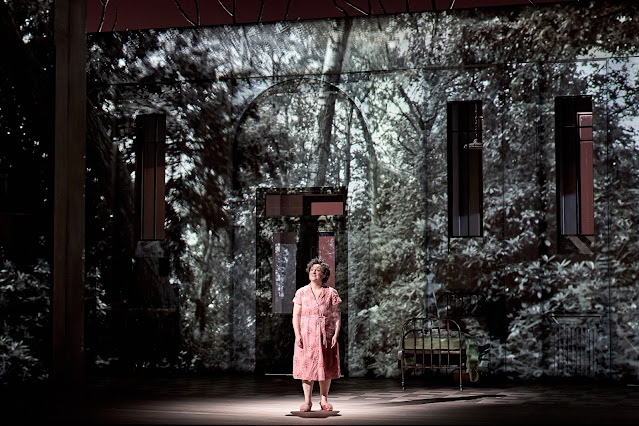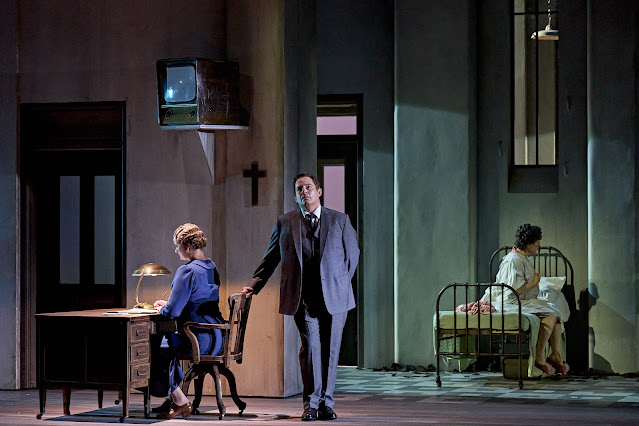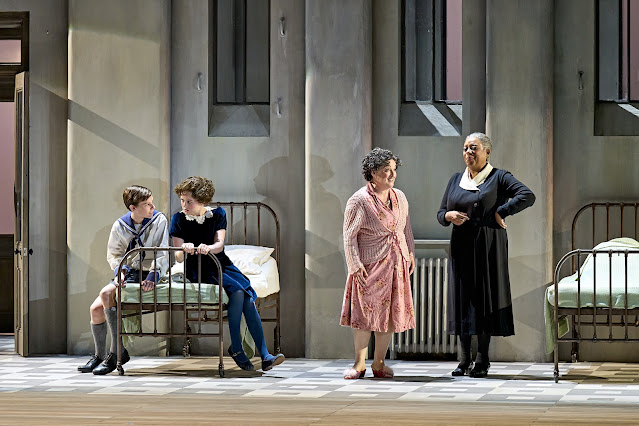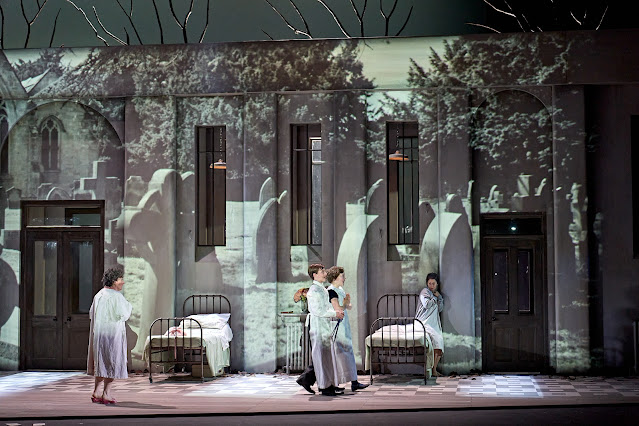 |
| Britten: The Turn of the Screw – Ailish Tynan – English National Opera, 2024 (Photo: Manuel Harlan) |
Britten: The Turn of the Screw; Ailish Tynan, Nicolai Flutter, Holly Hylton, Gweneth Ann Rand, Robert Murray, Eleanor Dennis, director: Isabella Bywater, conductor: Charlotte Corderoy; English National Opera at the London Coliseum
29 October 2024
Conductor Charlotte Corderoy makes her ENO debut with a poised and engaged performance in Isabella Bywater’s intriguing take on the opera, anchored by Ailish Tynan’s compelling Governess
English National Opera (ENO) opened Isabella Bywater‘s new production of Britten’s The Turn of the Screw at the London Coliseum on 11 October 2024, conducted by Duncan Ward who was making his ENO debut. For the final two performances of the run, the conductor was Charlotte Corderoy, also making her ENO debut.
On Tuesday 30 October 2024, we caught Charlotte Corderoy’s first performance conducting The Turn of the Screw, with Alan Oke as the Prologue, Ailish Tynan as the Governess, Nicolai Flutter as Miles, Holly Hylton as Flora, Gweneth Ann Rand as Mrs Grose, Robert Murray as Peter Quint and Eleanor Dennis as Miss Jessel. Designs were also by Isabella Bywater, with lighting by Paul Anderson and projections designed by Jon Driscoll.
In Henry James’ original story, it is possible to be uncertain whether the ghosts are a real presence or a figment of the Governess’ imagination, but by giving Peter Quint and Miss Jessel corporeal (and musical) presence in the opera, Britten and his librettist Myfanwy Piper, to a certain extent skew the drama towards the Governess being of sound mind and not imagining things. Productions often tend to be about influence and the nature of evil, and some explore different aspects of sexualised behaviour too. Whilst it is possible for Peter Quint to have sexual influence on both Miss Jessel and Miles [such as current ENO artistic director Annilese Miskimmon’s 2014 production for Opera Holland Park, see my review], in David McVicar’s production from the Maryinsky Theatre in St Petersburg which ENO borrowed in 2007 [see my review], Miles’ relationship to the Governess was highly sexualised too.
 |
| Britten: The Turn of the Screw – Eleanor Dennis, Robert Murray, Ailish Tynan – English National Opera, 2024 (Photo: Manuel Harlan) |
Isabella Bywater took a very different view. She presents the opera through the eyes of an older Governess, damaged by her stay at Bly and now institutionalised. The action moves between the older Governess’ institutional present and her flashbacks and hallucinations of the events at Bly, sometimes the two happening simultaneously. During the interludes, Jon Driscoll’s projections onto the rather bleak institution walls, created a vivid impression of the Governess’ memories of Bly. Bywater’s production does not quite take a stand on the ghosts, they are vividly present yet what we are seeing are the Governess’ memories or hallucinations. What is real is the Governess’ reactions, incarnated in a thrilling performance by Ailish Tynan.
We never see the younger Governess, Tynan plays her throughout as the older woman, shuffling about in fluffy slippers and sometimes interacting with the children from her bed. After each of the Governess’ interactions with the ghosts, Tynan came forward toward the front of the stage and her reactions were both thrilling and vivid. In the first Act, when the Governess sees Miss Jessel (and we do not) and is convinced that Flora (Hollie Hylton) sees her too, the intensity of Tynan’s performance disturbed, and as the drama built, there was a the sense of thrill as Tynan’s compelling depiction of the Governess’ mental disintegration became the key focus of the drama and gripped us from beginning to end. This was a truly remarkable performance. It was an interpretation that placed a lot on Tynan’s shoulders, but she responded as great singing actress, words, gesture, voice, all contributing to a remarkable, compelling whole.
As the children (roles that are double cast), Nicolai Flutter and Holly Hylton were poised and very contained (note, in the photographs the roles are played by Jerry Louth and Victoria Nekhaenko). Both sang fine and true, and their various games had a very contained otherness to them, these were highly personal games. In her programme note, Bywater talked about Anna Freud and Dorothy T. Burlingham’s book, War Children where they observe that children who had been through the horrors of the Second World War did not talk about their experiences, they played them. This is what was suggested here. Both Flutter and Hylton were self-contained, there was little sense of Flutter’s Miles being influenced by Robert Murray’s Quint, nor of this Miles being sexually precocious with Tynan’s Governess. Flutter was cool and poised and his most important relationship was with Hylton’s equally poised Flora, the two’s games seeming to exist in a different plane.
 |
| Britten: The Turn of the Screw – Jerry Louth, Victoria Nekhaenko, Ailish Tynan, Gweneth Ann Rand – English National Opera, 2024 (Photo: Manuel Harlan) |
As Peter Quint (but not the Prologue), Robert Murray was presented at times as another one of the institution’s porters, as if Tynan’s Governess was conjuring Quint from her imagination using the things that are to hand. Murray’s Quint was not explicitly a ghost yet his fine performance had a distinct otherness to it, that this Quint existed in a different plane. It helped that Murray sang Quint’s wonderfully melismatic passages with a fine feel of focus and intensity. This Quint was seductive and attractive, but in a neutral way, his only strong relationship was his abusive one with Eleanor Dennis’ Miss Jessel.
Dennis’ Miss Jessel was firmly in the past, her clothes were not those of the Governess’ present and there was not sense of timeslip here the way there was with Murray’s Quint. Dennis made Miss Jessel melancholy and other, out of kilter with everything else whilst she emphasised the way the character tends to dwell and circle on one thing, her relationship to Quint. The opening scene of Act Two, between the two, was enormously disturbing and made it clear that the relationship could only have been a damaged one.
Gweneth Ann Rand made a highly active Mrs Grose, giving the slightly neutral housekeeper a sense of vivid presence in Act One, making her seem to have much more agency. Rand had a way of making each of Mrs Grose’s utterances seem more present and more vividly active than can sometimes be the case, and I rather regretted the way the story sidelines her in the second act.
Alan Oke’s fine Prologue was a doctor discussing the older Governess’ case with a nurse. Oke gave a fine, controlled and neutral performance, presenting the case without opting for any conclusions. The cast was completed with three actors, Vincent Carmichael, Rachel Laird and Vita Pugliese
 |
| Britten: The Turn of the Screw – Ailish Tynan, Jerry Louth, Victoria Nekhaenko, Vita Pugliese (actor) – English National Opera, 2024 (Photo: Manuel Harlan) |
In the pit, Charlotte Corderoy gave an amazingly poised and engaging account of herself, keeping the drama moving yet leaving space for the singers. I was not able to get to any of Duncan Ward’s performances so have no idea how the two compare. Here Corderoy encouraged the 13 instruments of the ENO orchestra to produce finely individual lines, weaving a web of sound that was sometimes diaphanous yet always with each line a strong presence in the large space of the London Coliseum.
The blog is free, but I’d be delighted if you were to show your appreciation by buying me a coffee.
Elsewhere on this blog
- An engaging evening of fun: demonstrating the very real virtues of Gilbert & Sullivan at its best, Ruddigore at Opera North – opera review
- Beyond the idea of just four guys & their trombones: Slide-Action on their mission to create a new voice for the trombone – interview
- Character, charm & 60s vibe: Britten’s A Midsummer Night’s Dream at Opera North – opera review
- Attention to detail & sheer energy: Haydndyah from Lars Ulrik Mortensen & Concerto Copenhagen on Berlin Classics – record review
- Over-arching themes and influences: Andrew Ford’s The Shortest History of Music – book review
- Inventive and imaginative: Olivia Fuchs’ successfully reinvents Rimsky Korsakov’s The Snowmaiden for English Touring Opera – opera review
- Portraits of a troubled family: Bernstein’s Trouble in Tahiti & A Quiet Place at the Royal Opera House – opera review
- Leading with a love that inspires: Tafelmusik has a new collaboration with violinist Rachel Podger & a new disc of Haydn symphonies – interview
- A themed programme with an imaginative difference: Music from Pole to Pole with City of London Sinfonia and atmospheric physicist Dr Simon Clark – concert review
- Sound magic: En Couleur from the percussion group, Trio Colores – record review
- Home


.jpg?w=998&resize=998,665&ssl=1)







